
Juan Luis Guerra Seijas is a Dominican musician, singer, composer, and record producer. He has sold 15 million records worldwide, making him one of the best-selling Latin music artists. Throughout his career, he has won numerous awards including 24 Latin Grammy Awards, three Grammy Awards, and one Latin Billboard Music Award. He won 3 Latin Grammy Awards in 2010, including Album of the Year. In 2012, he won the Latin Grammy Award for Producer of the Year.

Para Ti is the ninth studio album by singer-songwriter Juan Luis Guerra and his band 4.40. It was released on August 31, 2004, by Vene Music and distributed by Universal Latin Music. It was his first studio album in six years since Ni es lo mismo ni es igual (1998) and is his first Christian-gospel inspired album. The lyrics are inspired by his conversion to Christianity and his experience of been a born again Christian. The album explores music genres from gospel and ballads to the salsa and merengue. The album was supported by the release of three official singles: "Para Ti", "Las Avispas" and "Dinteles".

Ni Es lo Mismo Ni Es Igual is the eighth studio album recorded by Dominican singer-songwriter Juan Luis Guerra and his backup vocals 4–40. It was released by Karen Records on 15 December 1998 and distributed by PolyGram Latino. It was Guerra's comeback album after four years of silence, out of the public eye and since his conversion to Christianity. It was his first studio album since Fogarate (1994). The album production and songwriting were done by Guerra. The album was supported by the release of four official singles: "Mi PC", "Palomita Blanca", "El Niagara en Bicicleta" and "La Hormiguita". Two singles were released as promotional singles: "Vale La Pena" and "Quisiera".
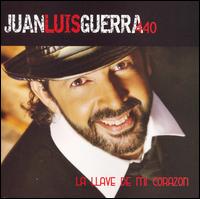
La Llave de Mi Corazón is the 10th studio album recorded by Dominican singer-songwriter Juan Luis Guerra, It was released by EMI Televisa Music on March 20, 2007. It was Guerra's first album to contain songs in English since his 1994 recording of Fogarate. The album contains fusions of mambo and tropical rhythms that Guerra himself defined as "Mambo merengue". Its production and musical structure of album is based on merengue, bachata and salsa and encompasses elements of Blues, Son, Jazz, Mambo and Bossa Nova. The album was written, arranged and produced by Juan Luis Guerra and according to the artist is his most romantic album. It is composed of four merengues, two bachatas, three romantic songs and two salsas.

Ojalá Que Llueva Café is the fourth studio album by Dominican singer-songwriter Juan Luis Guerra released in 1989 by Karen Records. It is considered one of his most emblematic and important albums. The album set the musical path for his later albums, re-formulating Dominican merengue and bachata music through the contemporary elements of pop, rock, salsa, or jazz. Incorporating socially conscious lyrics with danceable merengues and romantic-poetic bachatas, the album is considered one of the most important albums of his discography.

Fogaraté! is the seventh album of the famous Dominican songwriter and musician Juan Luis Guerra. It was released on July 19, 1994. The album mixed a variety of music genres including rural and flolklroic rots of merengue called "Perico Ripao" with elements of African soukus music and Tropical Music such as Reggae with the collaboration of African guitarist Diblo Dibala and Dominican accordionist Francisco Ulloa, along with Son, Bachata and Salsa. Also, the album features a particular, bachata-styled adaptation of the Lacrimosa movement from Mozart's Requiem Mass in D Minor and Guerra's first song fully in English "July 19". Exploring lyrics and themes about magical realism of Latin American literature and commenting on the politics of the Caribbean, for many fans and critics, Fogaraté! is one of his most musically complex album.
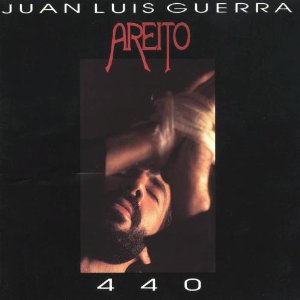
Areíto is the sixth album by Juan Luis Guerra with his band 440, released on 8 December 1992, by Karem Records. The album, meant to be a tribute to the indigenous tribes of the Dominican Republic, is named after a dance that the aboriginal inhabitants of the Greater Antilles (Taínos) accompanied with songs during their festivals and religious rites. The album contains twelve tracks including "Cuando te Beso", interpret by Santo Domingo Philharmonic Orchestra. Congolese musician Diblo Dibala played guitar on the song "El Costo de la Vida", which was a Spanish cover of his own soukous song "Kimia Eve", while the last track on the album, "Naboria daca, mayanimacaná", is sung in Arawak, the language of the Taíno people. Areíto was originally set to be released in early April 1992, but was first delayed to the end of October 1992 and was finally released on 8 December 1992.
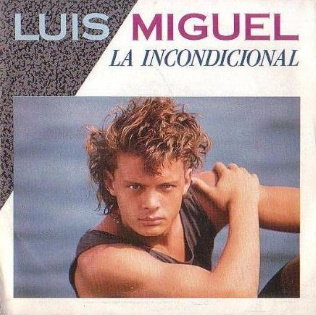
"La Incondicional" is a song written, produced, and arranged by Spanish musician Juan Carlos Calderón and performed by Mexican singer Luis Miguel. It was released in 1989 via WEA Latina as the third single from Miguel's sixth studio album, Busca una Mujer (1988). The song became his second #1 single on the Billboard Hot Latin Tracks chart after "Ahora Te Puedes Marchar" in 1987. The song broke several airplay records in Latin America, topping the charts in Mexico, Chile and Peru; and the top-ten in other countries. The success of the song helped push the album to #3 on the Billboard Latin Pop Albums with approximate sales of four million units.
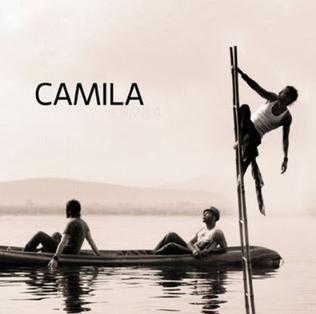
Dejarte de Amar is the second studio album recorded by Mexican pop rock band Camila, It was released by Sony Music Latin on February 9, 2010 Produced by band leader Mario Domm and mostly written by Domm and Mónica Velez, the album became a success in the United States and Mexico. The album was certified Disco Platino in the United States by the RIAA and 4× Platinum in Mexico by AMPROFON. It was recorded in Mexico at Mamita Studio with theme about love, loneliness and lies. The album spawned three singles: "Mientes", "Aléjate de Mi", and "Bésame", all of which reached number-one on the Billboard Latin Pop Airplay chart. The album received generally positive reviews for its arrangements and compositions.

Grandes Éxitos de Juan Luis Guerra y 440 or simply Grandes Éxitos is a compilation album of Dominican singer-songwriter Juan Luis Guerra, and his band 440 released in July 1995 by Karem Records. It contained Guerra's fifteen biggest hits from 1988 to 1994 on the original version and from the albums Mudanza y Acarreo(1985) to Fogarate! (1994) on the international versions. The compilation receive positive reviews by the critics.
The Dominican singer, songwriter and producer Juan Luis Guerra has released 14 studio albums, two live albums and forty-eight singles. He is one of the best selling Latin artist of all time with more 30 millions of records worldwide. He made his debut with his first studio album Soplando, released in 1984. He later released his second studio album in 1985, Mundanza y Acarreo which was his first national success and marked his first entry at the US Billboard Charts at number seventeen on Billboard Tropical Charts. In 1987, his third studio album Mientras Más Lo Pienso...Tú become his first work to gain international attention in countries such as Venezuela and Puerto Rico. Between this last two albums, it sold over two million copies worldwide.
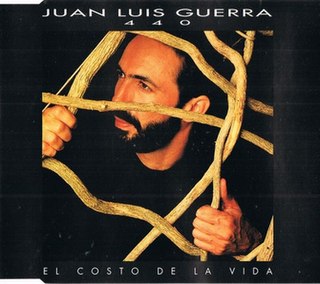
"El Costo de la Vida" is a song by Dominican Republic singer-songwriter Juan Luis Guerra from his sixth studio album, Areíto (1992). The song was released as the album's third single in 1992 by Karen Records. It is a Spanish-language adaptation of soukous song "Kimia Eve" composed by Diblo Dibala. The song features Dibala on the guitar and is performed by Guerra as a merengue number. The lyrics to the song provides a social commentary to the rising cost of living, while the artist denounces the dislevel of socioeconomics as well as political corruptions in Latin America. He also references the racial identities of Latin America.

"Bachata Rosa" is a song by Dominican Republic singer-songwriter Juan Luis Guerra released in 1991 and served as the lead seventh and final from his fifth studio album Bachata Rosa (1990). Along with Estrellitas y Duendes and Como Abeja Al Panal, is one of Guerra's first international hits and helped to contribute to the bachata sophistication and have recognition in Latin America and Europe. The track was a commercial success, toping the airplay charts in Mexico and was the fourth single of the album to peak insade of the top 10 at the US Hot Latin Tracks.
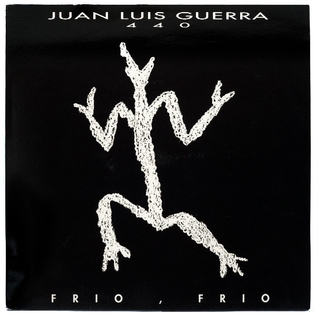
Frio Frio or Frio, Frio is the lead single of the sixth studio album Areito by Dominican superstar Juan Luis Guerra. The song is considered to be a bachata by many, however it is actually a bolero. It was written based on a poem by Federico García Lorca and was released in August 1991. The track received positive reviews from critics and was nominated for Tropical Salsa Song of the Year at the 4th Lo Nuestro Awards. Frio Frio was a success peaking at number 4 on Billboard Hot Latin Tracks and at the Top 5 airplay in Panama and Uruguay.
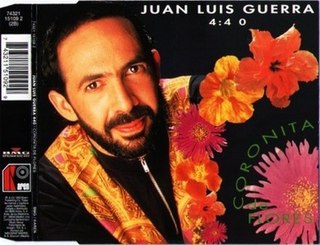
Coronita de Flores is the fifth single of Juan Luis Guerra sixth studio album Areito, released in 1993 by Karem Records. The song was written band produced by Juan Luis Guerra. The track received positive reviews due the musical structure of cha-cha and Bolero and was nominated for Tropical/Salsa Song of the Year at the 1994's Lo Nuestro Awards.

Rompiendo Fuente(English: Water Break) is the sixth single of Juan Luis Guerra sixth studio album Areito, released in 1993 by Karem Records. The song was written and produced by Juan Luis Guerra and his band 4:40. The tracks is a merengue with some elements of Afropop inspired Taino Indigenous. The song is a metaphor lamenting precarious situation of a woman working on a factory that is giving a birth to a girl. The track receive favorable reviews by the critics. Howell Llewelyn from Billboard on an article wrote about the song "the most touching song ever written by a man on the subject of giving birth".
Cuando Te Beso(English: When I kiss you) is the seventh and final single of Juan Luis Guerra sixth studio album Areito, released on 1993 in Europe and in January 1994 in the United States by Karem Records. The album also contained other version of the track performed by the Santo Domingo Philharmonic Orchestra. The song peaked at number 28 on the US Hot Latin Songs and reached the top-ten in Chile and Panama. The track receive positive reviews by the critics. Ramiro Burr from Austin American Statesman stated that track is "an affecting tale of devotion". Robert Hilburn from Los Angeles Times wrote that the track had percussion "had some wonderfully affecting ballad work".
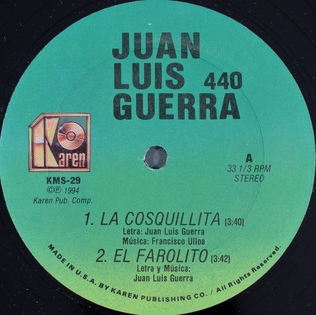
La Cosquillita is the lead single of the seventh studio album Fogarate! by dominican superstar Juan Luis Guerra. It was released on June 21, 1994 by Karen Records. The rural merengue track was written and produced with the Dominican accordionist Francisco Ulloa and his band. About the success of the track, Guerra stated "With the `perico ripiao' we are doing the same thing that we did with the `bachata,' breaking down the barriers that prevent it from reaching all of Dominican society, and then exporting it". The song became Guerra's first number-one hit in his native Dominican Republic; and became a top-ten hit in Spain, Venezuela and the US Hot Latin Songs chart.
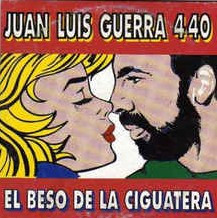
El Beso de la Ciguatera is a song by Dominican Republic singer-songwriter Juan Luis Guerra released as the third single for his album Fogarate (1994) with the collaboration of Diblo Dibala. The song was released in January 23, 1995 by Karen Records. The track encompasses merengue with soukus. The song was a recipient of a Broadcast Music, Inc. (BMI) Latin Award in 1996. Commercially, it reached the top ten on the Billboard Hot Latin Songs and Tropical Airplay charts in the United States. It also received moderate airplay in Europe.














